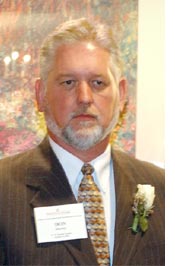W. Don Shurley

2003 D.W. Brooks Award for Excellence in Extension
Department: Agricultural and Applied Economics
Dr. Don Shurley, Department of Agricultural and Applied Economics, is widely recognized as one of the nation's leading cotton economists. Shurley is a member of the UGA cotton team and has a strong program of multidisciplinary involvement through county educational meetings, workshops and field days and as co-investigator on applied research projects.
Shurley's economic analysis provides a key component to the decisions of the state's cotton producers. His work shows that Georgia cotton farmers can increase their profits by $40 million annually by changes in the type of seed technology used. His research also shows that Georgia cotton farmers can increase profit by $88 million annually using improved defoliation and harvest timeliness.
His educational programming led the state's cotton industry through a period of rapid acreage expansion and political and economic volatility. The value of Shurley's work in this area is immeasurable. His educational efforts helped cotton farmers through three farm bills and changes in trade policy.
Shurley helped producers analyze marketing decisions, manage price risk and understand the complexities of government programs and program payments resulting in millions of dollars of additional farm income annually.
The expansion of cotton acreage in Georgia created the need for additional ginning capacity. From 1993 to 1996, Shurley completed feasibility studies for eight new cotton gins in Georgia -- a $32 million investment.
The 2002 farm bill was the most wide-ranging, difficult and complex of any farm bill in recent memory. It was an especially critical piece of legislation for Georgia farmers because it allowed them a one-time opportunity to update crop bases and payment yields and eliminated the peanut program. Shurley served as the college's leader and coordinator on 2002 farm bill educational programming.
He conducted 63 educational meetings (producer meetings, county Extension agent training and banker/lender training) on the farm bill, with a total attendance of more than 3,600. He also helped the USDA Farm Service Agency conduct farm bill training and developed a computerized decision aid to help farmers and landowners make informed decisions on very complex issues.
Furman Peebles, Dodge County Extension coordinator, said, "His computer model was used on 273 of the 709 farms in Dodge County, which would account for 40-plus percent of the farmed acreage. This model not only had a positive impact for agriculture in Georgia but also saved a large number of relationships between landlords and tenants, farmers and bankers and fathers and sons."
Over the years, Shurley has also been a source of timely analysis provided to industry leaders and legislators on many policy issues. His work has been instrumental in the passage of government policies beneficial to Georgia cotton farmers.
David Ruppenicker, executive vice president of Southern Cotton Growers, Inc., had this to say about Shurley: "Over the years, I have had the opportunity and pleasure to work with numerous land-grant university personnel from several states. I can count on one hand those who have truly made a difference within an industry, or in other words, gone the extra mile. Don Shurley is one such individual."
